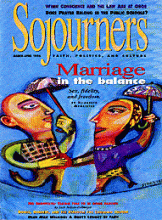Evelyn Waugh once suggested to Thomas Merton that, fine though he was as an author, his gift as a correspondent was so profound that he ought to give up every other form of writing in order to devote himself to letters. Merton's 50 publications demonstrate that Waugh's advice wasn't taken, but still Merton found time for a great many
letters and most have now been published, though it has taken nearly 10 years of editing work and five big volumes to do so.
Freedom to Witness is subtitled Letters in Time of Crisis. True, each era has felt for those then living to be a time of crisis, but rarely has crisis been more teeth-rattling than in the century that is about to end. Merton's life filled barely half of this blood-stained era. Born in France as World War I was getting under way, he died 54 years later at a conference center in Thailand, just one border removed from the Indochina War. His body was flown back home in a U.S. Air Force plane bringing back soldiers killed in Vietnam-just the right company for Merton.
Merton as monk had the right address not to notice that the world was in crisis. His thoughts on entering the Abbey of Gethsemani (just three days after the attack on Pearl Harbor) suggest he had no intention of keeping up with events beyond the monastic enclosure. No one ever walked out on the world with a louder slam of the door. Merton intended to leave his name at the monastery gate and all his literary ambitions with it.
The abbot, the son of a book-binder, turned out to be a book-loving man. In time he noticed Merton's gifts. As a matter of obedience, Merton was sent back to the typewriter.
One of the oldest letters in Freedom to Witness has to do with the most famous result of the abbot's decision. In a letter dated January 2, 1947, Merton writes his agent, Naomi Burton Stone, about his autobiography, The Seven Storey Mountain. She
Read the Full Article
